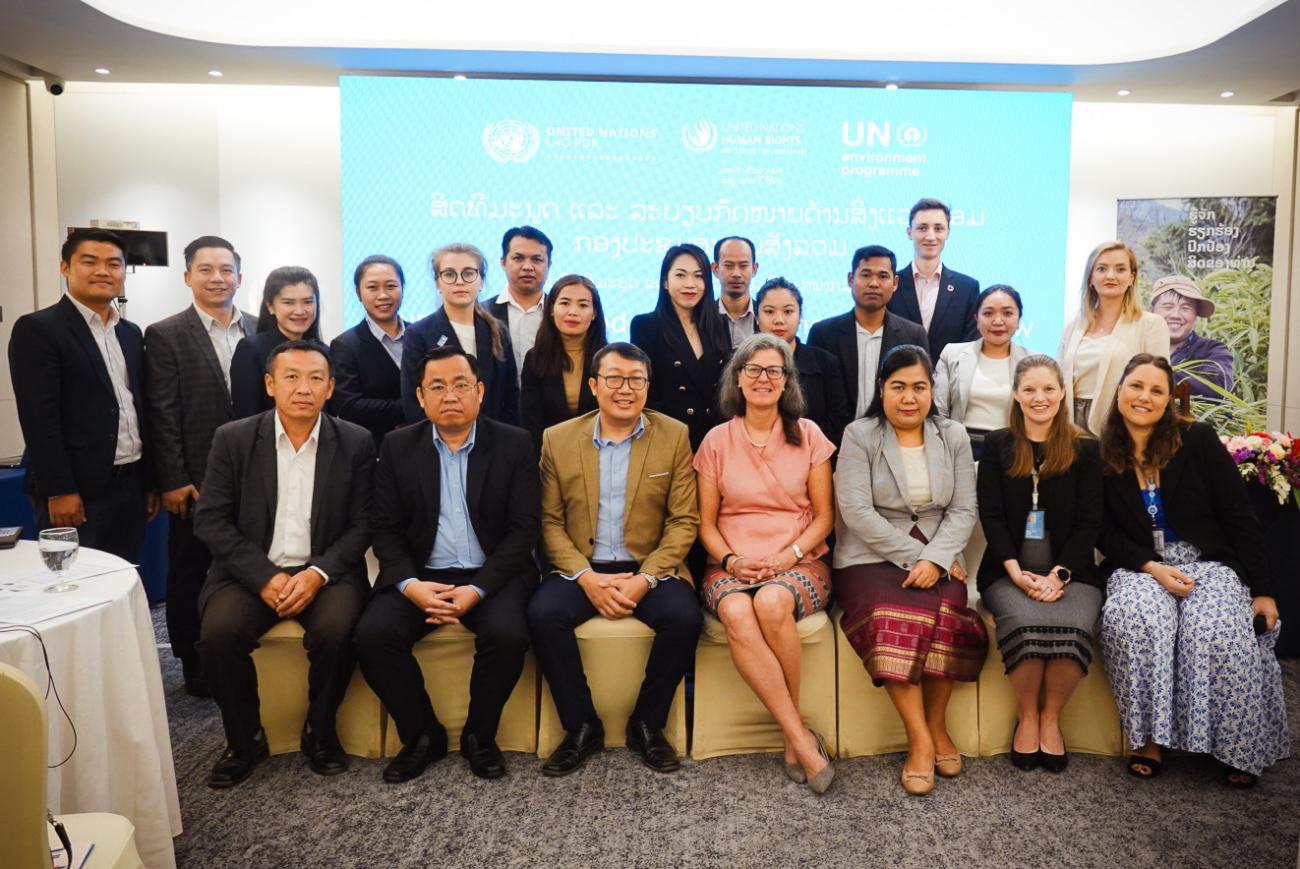Vientiane, 29 March 2023: Earlier this month, the United Nations Office of the High Commissioner for Human Rights, Regional Office for South-East Asia (OHCHR, SEARO) and the United Nations Environment Programme (UNEP) brought together the Government and the United Nations in Lao PDR in a first of a kind workshop series aimed to raise awareness on, and deepen the knowledge of, the inter-linkages between environment, climate change and human rights.
Delivering the opening remarks, Ms. Sara Sekkenes, United Nations Resident Coordinator to Lao PDR said, “As Government, United Nations, and development partners cooperate for the achievement of Lao PDR’s 9th National Socio-Economic Development Plan, it is our collective duty to include human rights considerations in our work”.
In July 2022, the General Assembly resolution 76/300 recognized the human right to a clean, healthy and sustainable environment. Since then, a growing number of international agreements and domestic legislation and policies have articulated the inter-linkages between human rights and the environment.
As Georgina Lloyd from UNEP highlighted referring to the work of the current and former UN Special Rapporteurs on Human Rights and Environment David R. Boyd and John Knox: “Human rights and the environment are deeply intertwined: human rights cannot be enjoyed without a safe, clean and healthy environment; and sustainable environmental governance cannot exist without the establishment of, and respect for human rights”.
Separate workshops were held for Government officials from the Department of Treaties and Laws (DTL) in the Ministry of Foreign Affairs (MoFA), from the Ministry of Natural Resources and Environment (MoNRE), Ministry of Planning and Investment (MPI), Ministry of Health (MoH), and Ministry of Agriculture and Forestry (MAF), as well as for UN agencies and entities to learn more about these critical issues. Representatives from the Food and Agriculture Organisation of the United Nations (FAO), International Organisation for Migration (IOM), United Nations Development Programme (UNDP), United Nations Office for Disaster Risk Reduction (UNDRR), United Nations Human Settlements Programme (UN-Habitat), United Nations Children's Fund (UNICEF), United Nations Industrial Development Organisation (UNIDO), United Nations Office on Drugs and Crime (UNODC), World Food Programme (WFP), and the UN Resident Coordinator’s Office (RCO) attended the workshop.
Speaking at the workshop, Ms. Romchat Wachirarattanakornkul from OHCHR, SEARO emphasized that Lao PDR “is amongst the most vulnerable countries to projected climate change trends where its communities face significant climate-related hazards that are exacerbated by poverty, malnourishment, and high exposure of poor and marginalized communities”.
The workshops raised awareness on some key issues for Lao PDR:
- The substantive and procedural elements of the right to a healthy environment, with the prior being the end result (these include safe climate, clean air, healthy ecosystems and biodiversity, safe and sufficient water, healthy and sustainable food, non-toxic environment), and the latter the precondition for the realization of substantive elements (including access to information, public participation, access to justice).
- The crucial role of environmental human rights defenders, who, at the forefront of environmental protection, are often the targets of harassment and threats for their exercise of fundamental human rights and for striving to protect the environment.
- The importance of nature to the human well-being and the enjoyment of human rights in Lao PDR, as most livelihoods are directly connected to the environment – notably through agriculture and fisheries.
- The identification of rights-holders and duty-bearers in relation to climate change, with States identified as primary duty-bearers in the light of their obligation to respect, protect and fulfil all human rights, but with other actors, including courts, businesses, civil society organizations and, ultimately, individuals with a role to play in the advancement and protection of the right to a healthy environment.
- The unequal burden of the triple planetary crisis of climate change, biodiversity loss and pollution falling on the most vulnerable and marginalized – particularly indigenous peoples, who rely on natural resources for survival, and women and girls.
Raising awareness in Lao PDR, a country rich in biodiversity, on the triple planetary crisis and on the need to strengthen the environment and human rights of those who protect it, has been one, but important, step towards the effective implementation of human rights in the country and the achievement of the Sustainable Development Goals (SDGs).




